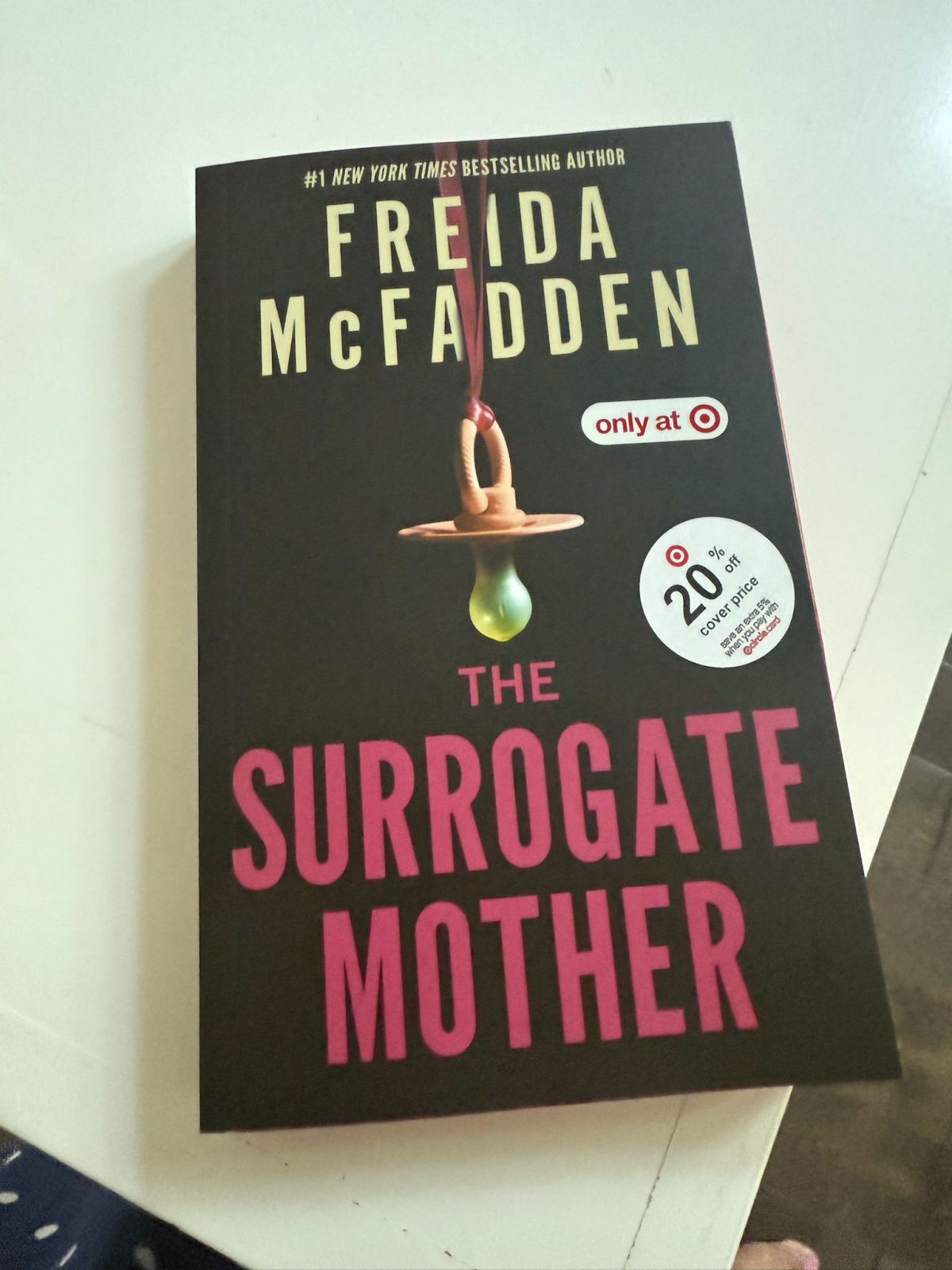
The Surrogate Mother – by Freida McFadden
Author and Context
Freida McFadden is the international bestselling author of psychological thrillers, including The Housemaid and Never Lie. She is also a practicing physician specializing in brain injuries. Her work frequently explores the dark side of the human psyche, examining deception, psychological manipulation, and the complexities of human relationships.
The Surrogate Mother was first published in 2018.
Freida McFadden is the international bestselling author of psychological thrillers. In addition to her career as an author, she is also a
Practicing physician specializing in brain injuries.
Her background in medicine often informs her narratives, which frequently explore the dark side of the human psyche. Her novels delve into themes of deception, psychological manipulation, and the complexities of human relationships.
Summary Plot
The novel follows the spiraling descent of Abby Alder, a successful advertising executive desperate for a child, as she agrees to a surrogacy arrangement with her young, attractive assistant, Monica Johnson, using Abby’s husband Sam’s sperm.
The Setup and the Downfall
Abby, unable to conceive and facing a failed adoption, is persuaded by Monica’s offer to be a surrogate in exchange for graduate school tuition. Abby ignores warnings from her friends and family, and Sam reluctantly agrees to the plan. However, as Monica’s pregnancy progresses, her behavior becomes erratic. She monopolizes Sam’s time at appointments, disregards Abby’s wishes, and changes her appearance, fueling Abby’s growing paranoia.
Abby’s professional life collapses when her relationship with her boss, Denise Holt, deteriorates. She is eventually fired after a routine drug test shows methamphetamines in her system. Even Sam disbelieves Abby’s plea of innocence, observing that her paranoia and insomnia suggest addiction. When Sam finds crystal meth planted in their home, he insists Abby go to rehab, jeopardizing the adoption.
Uncovering the Conspiracy
Abby begins to investigate, suspecting Monica engineered her firing and drug test. Her investigation accelerates when she finds Denise Holt stabbed to death with Sam’s engraved letter opener, and an email sent from Abby’s account implicates her as the prime suspect. Facing life imprisonment, Abby refuses a plea bargain, imagining Monica and Sam raising their baby.
Abby discovers that Monica fabricated parts of her identity, hiring a fake roommate. She tracks down Monica’s real mother, Louise Johnson, who reveals that Monica has a history of mental instability, likely murdered her best friend in high school, and had a previous affair with a married math professor named Sam. Abby realizes that Monica and Sam have been plotting together to get rid of her.
The Climax and Aftermath
Alone in her apartment, Abby is visited by her former assistant, Gertie, who insists on making her breakfast. When Monica arrives, Abby discovers the shocking truth: Gertie is Monica’s biological mother, and the two have been plotting together since Gertie’s time as Abby’s assistant, deliberately targeting Sam as the perfect father for Monica’s child. They plan to frame Abby’s death as a suicide using a lethal dose of sleeping pills in her breakfast.
The plot is violently derailed when Sam bursts into the apartment, frantically searching for Abby. Abby realizes Sam is innocent and has no romantic relationship with Monica. Monica, armed with a gun, wounds Sam, accidentally kills Gertie, and then shoots herself when she realizes Sam will never love her. Abby survives, and Monica is left in a comatose state. The baby is delivered safely, and the Adlers adopt him, naming him David. The novel ends a year later with David clinging to a yellow blanket, Monica’s favorite, hinting at the lingering presence of his biological mother.
My Conclusion
This story, with its suspense, leaves us with an incomplete feeling. The fact that Gertie was Monica’s mother was a super twist, but it felt like too much drama for everything that was going on. This book made us furious at many points. It’s not true that no matter how pregnant Monica was, she had to sit in the front seat of the car.
Another issue that doesn’t fit is the emails that kept being sent within the company when Abbie had already been fired. HELLO??? IT WHERE ARE YOU??? That gets blocked instantly. Schedule changes in calendars also notify you.
In conclusion, Sam is completely untrustworthy; we are not convinced that he didn’t have an affair with Monica: first, he didn’t even call Abbie to find out why she hadn’t arrived at the ultrasounds; he didn’t correct anyone when they said he was Monica’s husband; and the stepmother’s account (you arrive at her house, she doesn’t even ask for an ID and starts talking horrors about Monica, but never makes the disclaimer that that crazy woman IS NOT your daughter, because I would put myself forward right then and there) about the 3 years of an affair with a professor named SAM. HELLO ABBIE, what’s wrong with you?? WAKE UP ABBIE, where did SAM get all the contacts he gave you to vet Monica?? Also, the fact that the child David recognized the blanket implies that SAM has been taking the child to Monica. We also don’t believe she shot herself, but rather that there’s something fishy going on (“hay gato entre macuto” – literally ‘there’s a cat in the sack,’ meaning a hidden trick or conspiracy). What other inconsistencies did you find?
Iconic Places and Settings 🏙️
The primary setting is
New York City and its suburbs, reflecting the professional and personal lives of the Adlers and Monica.
Stewart Advertising : Abby’s workplace, which symbolizes the inauthentic nature of appearances and corporate ambition.
The Adlers’ Apartment: Represents a place of domestic happiness and stability that is ultimately corrupted by Monica’s infiltration.
Indianapolis, Indiana: Mentioned as the location of Monica’s family (which turns out to be her stepmother, Louise).
Boston, Massachusetts: Monica’s false claim of being a lifelong Red Sox fan hints at her fabricated identity.
Drink Pairings 🍹
These pairings reflect the novel’s themes of polished facades, sudden chaos, and the cold, calculated nature of the antagonist.
The Corporate Poison (Black Coffee): A straightforward, hot cup of black coffee.
Pairing Notes: Reflects Abby’s work environment and the shocking plot point of Monica drugging Abby’s coffee at work as part of her manipulation.

The Deceptive Martini (Gin or Vodka Martini): A classic, elegant cocktail, often seen as a sophisticated status symbol. Pairing Notes: Matches the affluent, polished facade of Abby’s advertising world, which hides the ugly truth of Monica’s plot.

The Red Flag Red (Red Wine): A bold red wine.
Pairing Notes: Reflects the color red, which Monica incorporates into her clothing and lipstick as she becomes more overtly sexual and predatory, symbolizing her danger and malignancy.

Enjoy your favorite drink with a yummy lasagna, made by Abbie from Sammy and MON to enjoy.




Character Analysis
Abby Adler
is the novel’s protagonist and first-person narrator, initially a wealthy, successful advertising executive whose life is shattered by the Psychological Impact of Infertility. Her deep desire for motherhood makes her desperately vulnerable to exploitation.
Decline and Isolation: The misguided surrogacy agreement leads to a psychological and physical decline, marked by uncharacteristic professional mistakes (due to Monica drugging her) and increasing isolation as her husband and boss are seemingly drawn to Monica. She transforms from a confident woman in an Armani suit into someone “rumpled and exhausted”.
Resilience and Agency: After being fired and framed for murder, Abby demonstrates inner reserves of strength. She actively seeks to uncover the truth and clear her name, gaining agency and resilience in the face of immense adversity.
Monica Johnson
is the novel’s antagonist, whose role as surrogate is the catalyst for the central conflict and the theme of Deception and Trust in Relationships.
Deceptive Persona: Initially described in glowing terms as “sharp as a tack” and a younger version of Abby, Monica uses this superficial resemblance to gain Abby’s trust. Her demure, cosmetic-free appearance is a deliberate ploy to suggest an absence of artifice.
Transformation: Once pregnant, her appearance dramatically shifts: she adopts red lipstick and low-cut outfits , signaling her transformation into a sexually confident, predatory threat.
Calculated Villainy: A math “genius” with a history of violence and mental instability , Monica channels her intellect into a devious plan to usurp Abby and keep the baby. Her unexpected survival leaves a threatening shadow over the Adlers’ future.
Sam Adler
is Abby’s handsome husband and a math professor, initially presented as “perfect” and undyingly faithful.
Authenticity and Support: His lack of interest in projecting an image (wearing glasses and avoiding designer clothes) symbolizes his honesty and integrity. He is a comfort and stabilizing force for Abby during their years of infertility struggle.
Hapless Innocent: He drives the conflict by being a hapless innocent; his honesty contrasts with Monica’s deceit. When Monica frames Abby, Sam is swayed by the evidence and doubts his wife’s innocence.
Ultimate Loyalty: His devotion is finally demonstrated when he risks his life to save Abby from Monica.
Denise Holt
is the chief marketing officer of Stewart Advertising and Abby’s boss.
Workplace Conflict: Her formidable, career-driven persona highlights the complexity of female workplace relationships, as she believes women must choose between ambition and motherhood. This view puts her in conflict with Abby’s desire for both a career and a family.
Tragic Ally: Initially an antagonist whose harsh critiques were partly justified (as Abby was drugged) , Denise becomes an unexpected ally who suspects Monica and is murdered while attempting to help Abby. Abby later recalls Denise as a positive role model who taught her how to be confident and professional.
Gertie
is Abby’s former assistant, whose reappearance prompts a sense of comforting nostalgia.
Deceptive Persona: Her kind, scatterbrained persona, combined with a noticeable limp and cane, conveys a harmlessness that provokes pity. This is a carefully calculated illusion.
Shocking Antagonist: Gertie is revealed to be Monica’s biological mother and a key conspirator in the plot to usurp Abby. She engineered her own accident to get Monica hired and her decision to kill Abby under the guise of cooking her breakfast subverts the symbolism of food and highlights Deception and Trust in Relationships
Background
The novel The Surrogate Mother explores the complex legal, ethical, and emotional considerations that make surrogacy a highly debated topic.
Types and Legal Ambiguity
Surrogacy is the process where an individual or couple finds someone to carry a pregnancy after conception via in vitro fertilization.
The novel focuses on traditional surrogacy, where the surrogate’s own egg is fertilized by the intended father’s sperm (or a donor’s), making the surrogate biologically related to the child.
The alternative is gestational or host surrogacy, where an already fertilized egg is implanted in the surrogate, meaning the intended mother is the biological mother.
Surrogacy agreements are often highly contentious because they must balance the rights and well-being of the surrogate, the intended parents, and the child. The legal framework in the U.S. is complicated by a lack of federal laws regulating the practice, leading to wide variations in state laws and uncertainty over legal parentage.
Ethical and Emotional Complexities
McFadden’s novel uses the conflict between Abby and Monica to reflect serious real-world issues surrounding surrogacy disputes.
Emotional Bonds and Consent: Disputes often arise when the surrogate changes their mind, making informed consent a key consideration. The 1986 “Baby M” case highlighted this, as surrogate Mary Beth Whitehead refused to give up custody, arguing she did not fully understand the psychological impact of giving up the baby after birth.
Commodification and Exploitation: Surrogacy agreements can also fail if the intended parents reject the child. The 2014 “Baby Gammy” case—where an Australian couple accepted only one twin, rejecting the boy who had Down syndrome—sparked international outrage. This incident highlighted how commercial surrogacy risks exploiting economically disadvantaged women and treating children as “returnable goods” based on health or desirability, ultimately leading Thailand to outlaw commercial surrogacy.
Themes
The novel explores three interconnected themes: the devastating psychological impact of infertility, the complex ethical considerations in surrogacy, and the central role of deception and trust in relationships.
The Psychological Impact of Infertility 💔
The plot is driven by Abby’s inability to conceive naturally , illustrating how involuntary childlessness profoundly affects mental and emotional well-being. Abby feels chronic disappointment and grief from failed IVF cycles, an early miscarriage , and a lengthy, ultimately failed adoption. This loss leaves her frustrated and bereft.
Eroded Identity: In a culture where motherhood is perceived as an inevitable life stage, Abby feels she has failed to fulfill a vital role, damaging her self-esteem. She describes herself as “the defective one”.
Vulnerability and Desperation: The emotional toll leaves Abby desperate and dangerously vulnerable. Her intense longing for a child causes her to ignore red flags and rush into the surrogacy agreement with a woman she barely knows, making her susceptible to Monica’s exploitation.
Ethical Considerations in Surrogacy ⚖️
The novel uses a surrogacy agreement gone wrong to delve into the complex ethical questions surrounding the practice.
Power Dynamics and Exploitation: Abby’s initial concerns that the arrangement could be viewed as an abuse of her professional power are easily dismissed by Monica. The novel touches on the commodification of the assistant’s body, as Abby desires Monica to treat the pregnancy as a business transaction.
Blurred Parental Boundaries: Once pregnant, Monica exploits the ambiguous area of parental rights before birth. Abby’s belief that she is the child’s mother conflicts with Monica’s proprietorial attitude, which is evidenced by Monica keeping the positive pregnancy test as a memento.
Vulnerability of Intended Parents: Monica’s continuous exclusion of Abby from appointments emphasizes the vulnerability and impotence that intended parents can feel, trapped by the consequences of an agreement they cannot control.
Deception and Trust in Relationships 🎭
The theme of deception and trust is central to the psychological thriller, highlighting how deceit can undermine relationships and destroy lives.
Monica as the Chameleon: The antagonist, Monica, is a chameleon-like character who skillfully uses the importance of appearances to manipulate others. Her initial modest clothing and lack of makeup reinforce her image as a trustworthy person. This contrasts with her true nature, which she masks to exploit the Adlers’ desires.
Erosion of Trust: Monica’s deliberate actions—drugging Abby and planting evidence—successfully erode Sam’s trust in his wife, undermining Abby’s sense of reality and isolating her psychologically.
Advertising as Metaphor: Abby’s career in advertising serves as a metaphor for this theme. Her skill in manufacturing misleading images (creating campaigns that conflict with her private opinion of the products) ironically echoes how Monica uses deceit to frame her.
The Foundation of Marriage: Abby’s initial resistance to checking Sam’s phone stems from the understanding that trust is a crucial foundation of their marriage. The full restoration of Abby and Sam’s faith in each other by the novel’s end emphasizes the immense vulnerability involved in navigating intimate relationships.
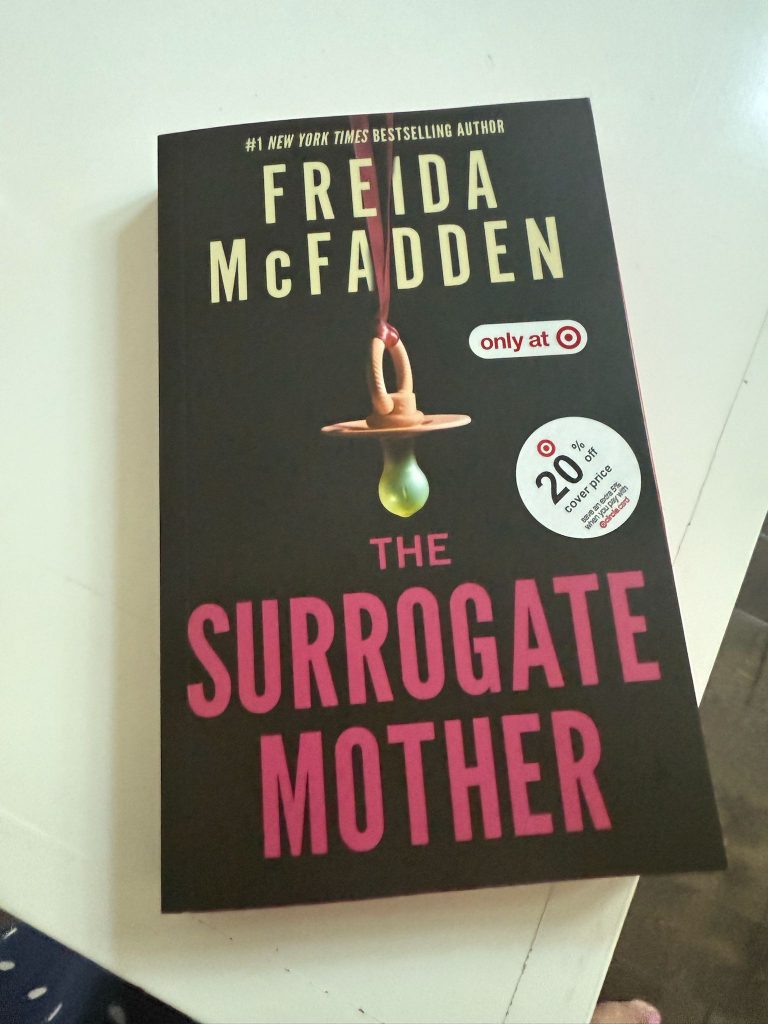
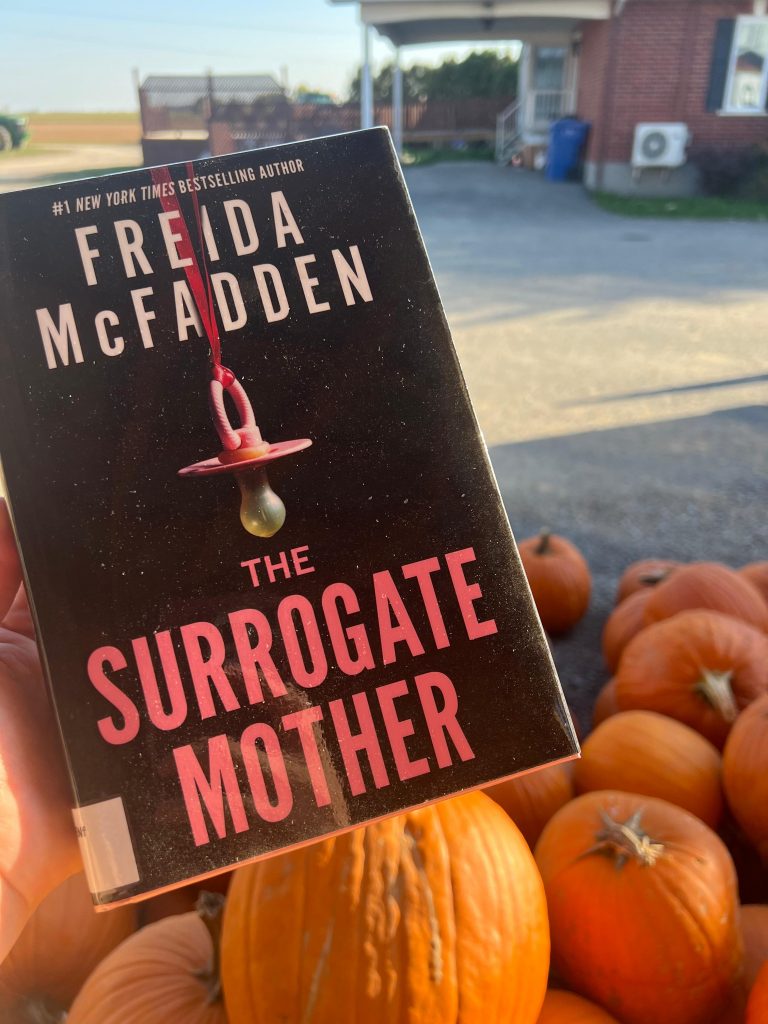
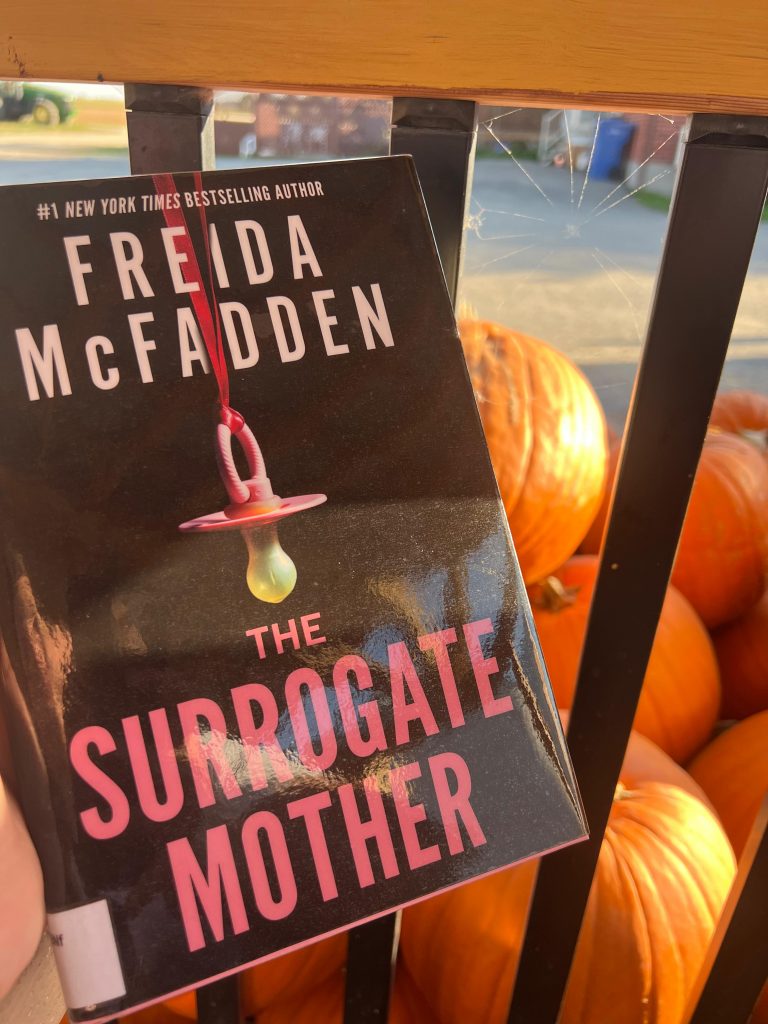
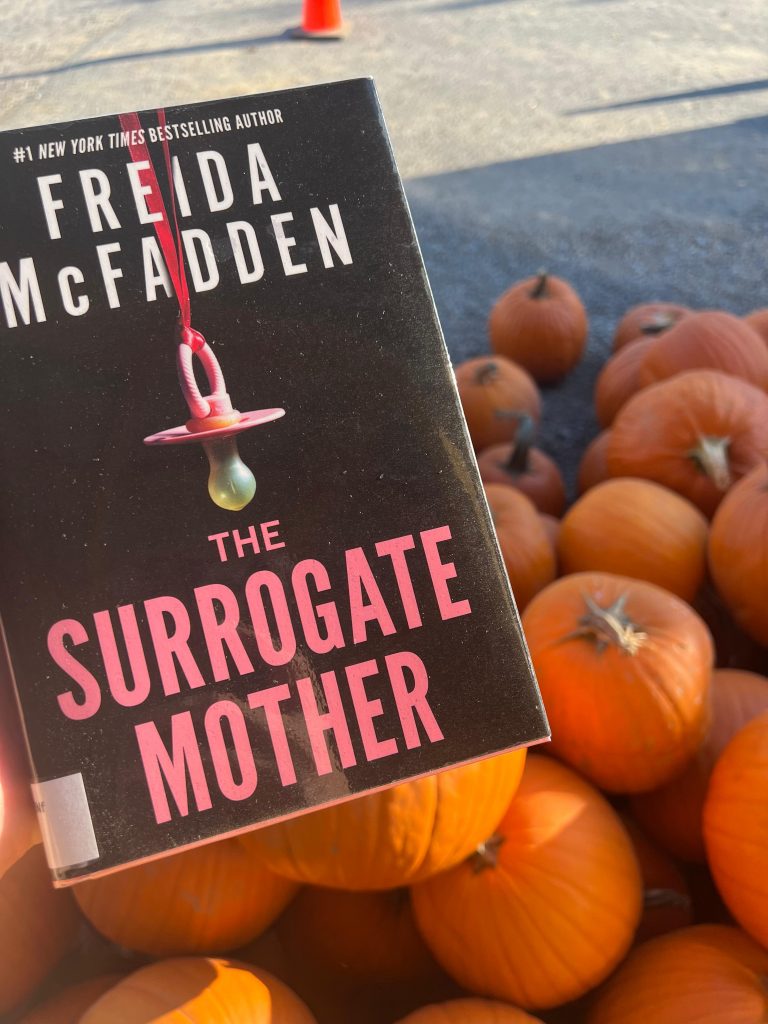
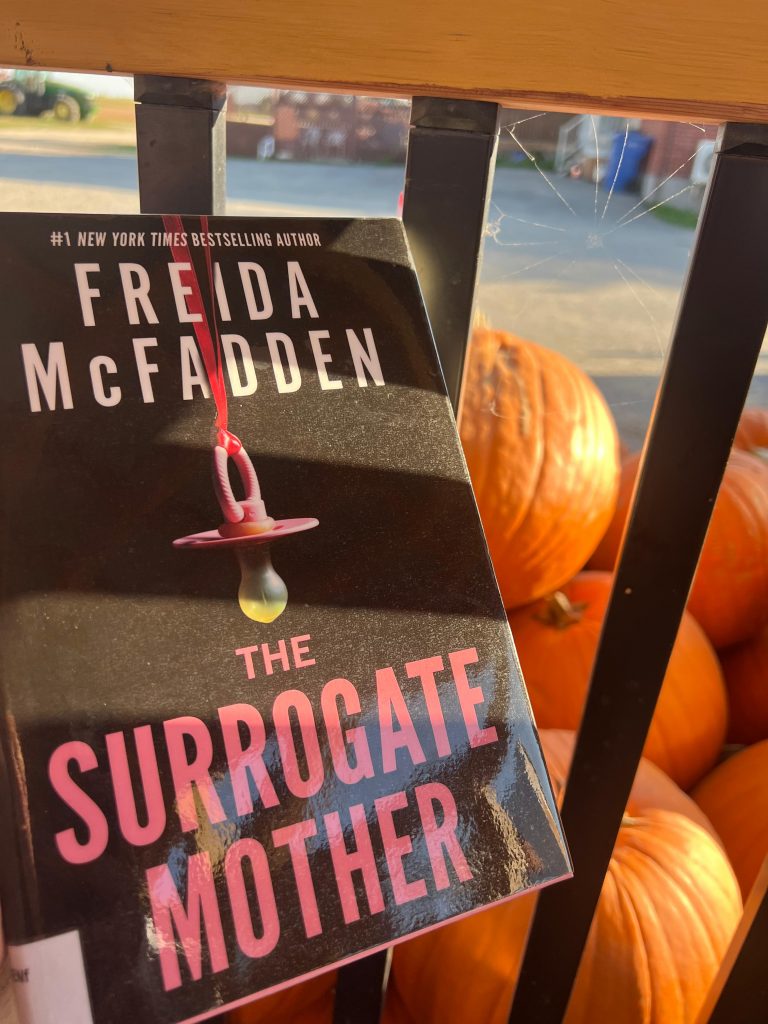
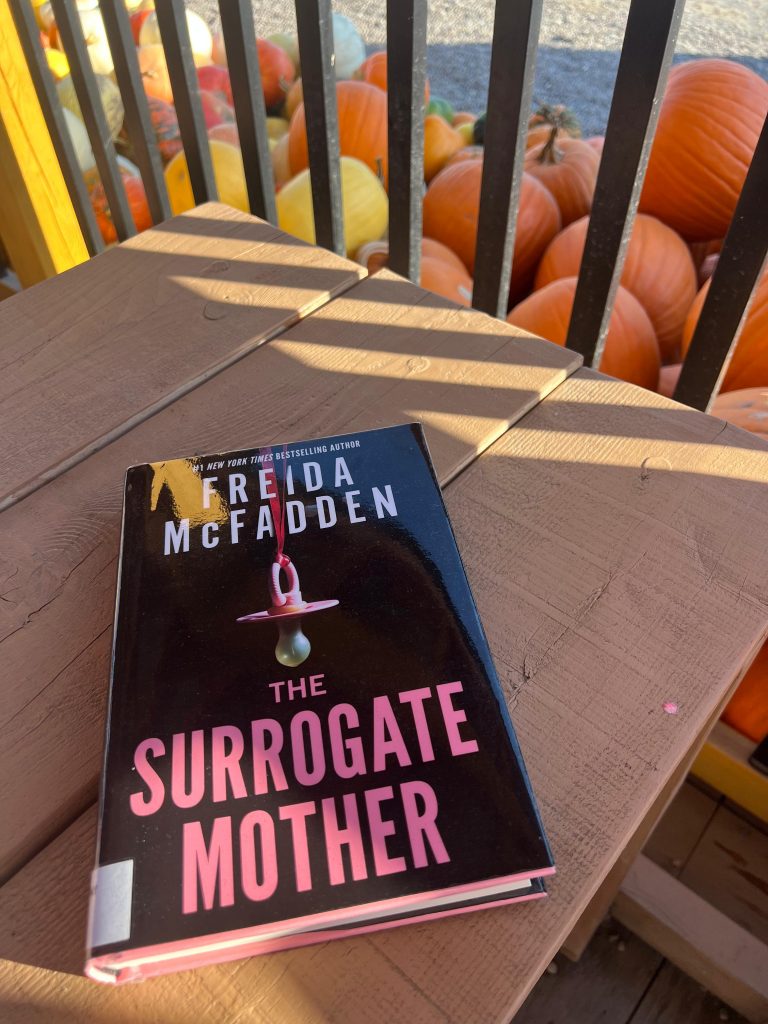
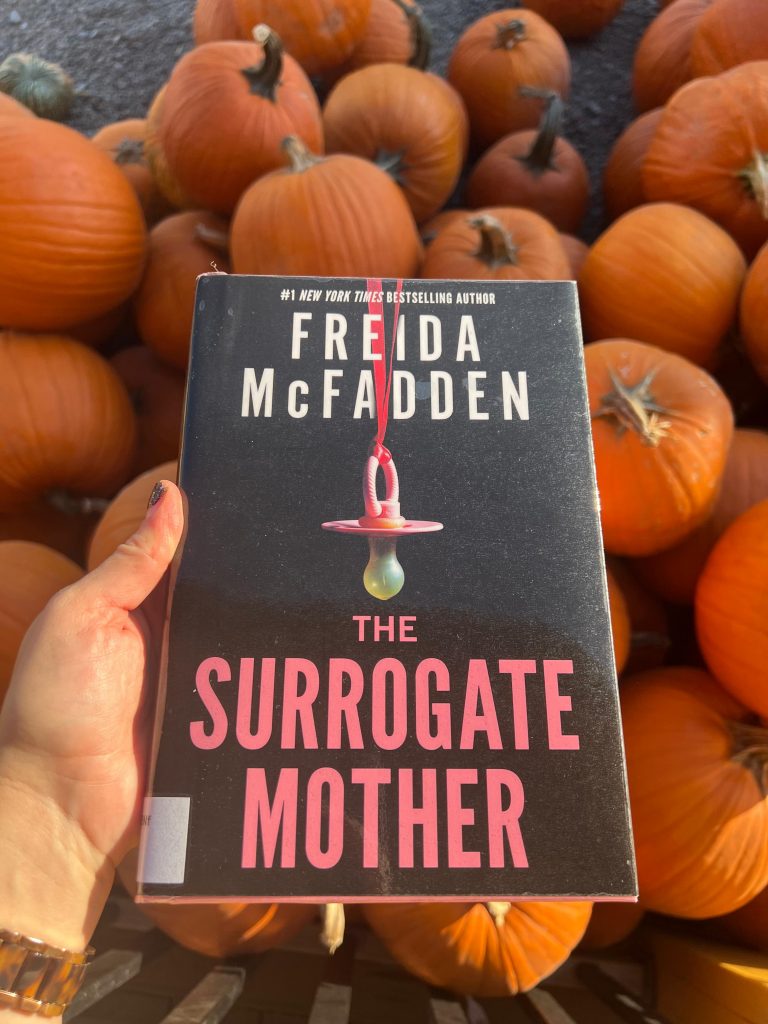
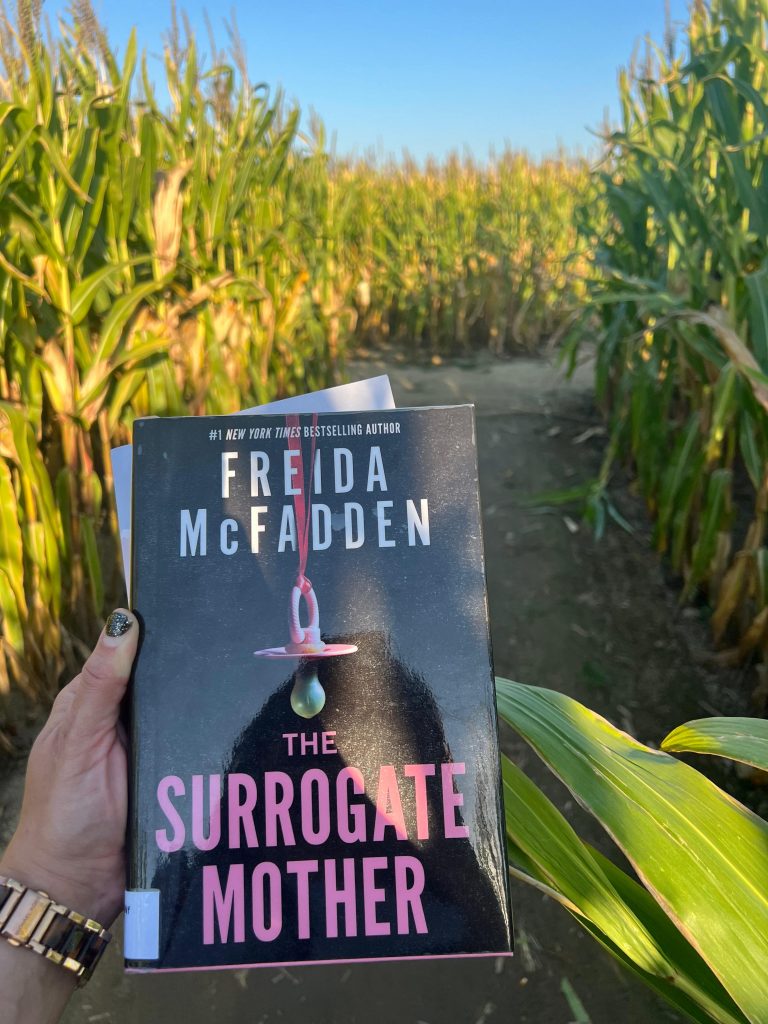
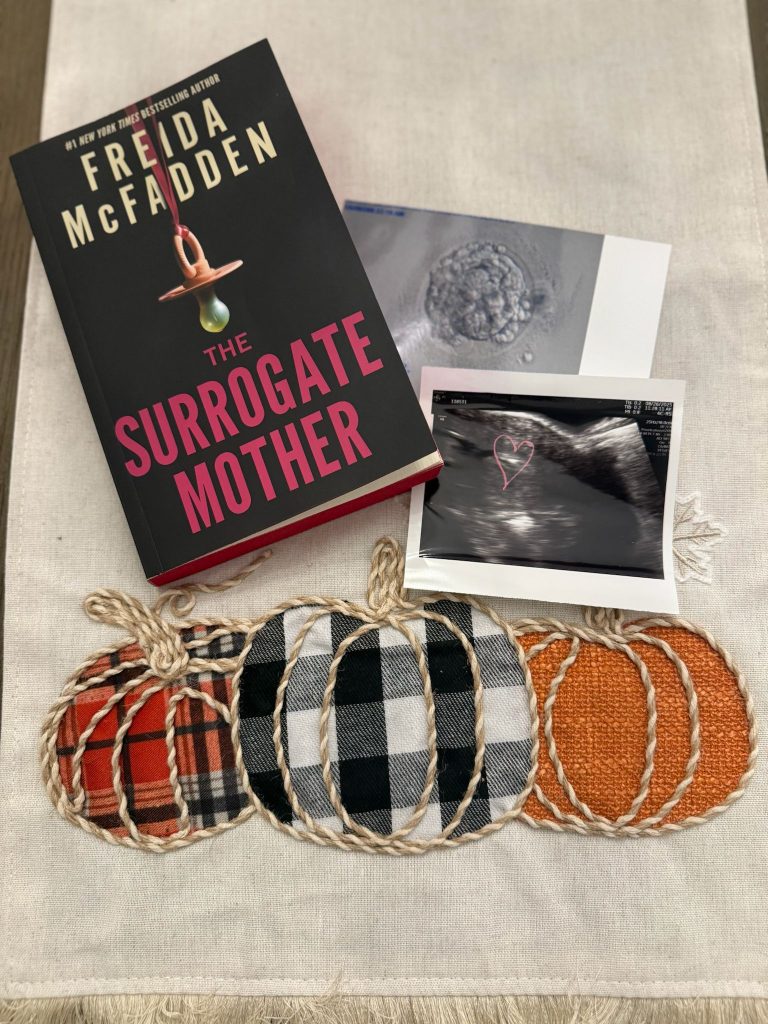
Book Club Questions
What was your initial impression of the protagonist, Abby Adler? Did your feelings of sympathy or frustration toward her change as her own complicity (albeit manipulated) and later her resilience were revealed?
Discuss what you liked most and least about The Surrogate Mother. Were the numerous, quick plot twists satisfying, or did they feel overwhelming?
How does The Surrogate Mother compare to other psychological thrillers by Freida McFadden? Do you recognize her distinct narrative patterns (e.g., unreliable characters, extreme twists) in this novel?
Personal Reflection and Connection
Trust vs. Suspicion: Despite her misgivings about Sam and Monica, Abby was reluctant to check her husband’s phone, viewing it as a betrayal of marital trust. Would you have checked his messages sooner? How important is absolute trust in your own intimate partnerships?
Infertility and Gullibility: Abby ignores several major red flags in her early interactions with Monica. Given the severity of The Psychological Impact of Infertility she faced, do you find her gullibility understandable, or did it frustrate you? To what extent is Abby responsible for the plot that unfolded against her?
Parental Rights: After one of Monica’s checkups, a conflict arose over who deserved the first photo of the fetus. Which one of them had the moral right to the photograph, and at that point in the narrative, who was the baby’s rightful mother?
The Final Scene: The novel ends with David clinging to a blanket that smells of Monica’s lavender perfume. Did this final, unsettling image resonate with you? Do you believe David has inherited Monica’s instability, or is he simply reacting to a primal, sensory memory?
Societal and Cultural Context
Workplace Challenges: Discuss how Abby’s experiences in advertising (her need to look polished, the disapproval of her taking parental leave) reflect the challenges and gendered expectations many women face in the modern U.S. workplace.
Surrogacy Ethics: How does the novel highlight the legal and emotional complexities of surrogacy? Did The Surrogate Mother‘s extreme scenario change your perspective on surrogacy, particularly concerning the vulnerability of the intended parents?
Motherhood Expectations: Discuss how Abby’s experiences highlight American societal expectations surrounding motherhood and fertility. Why is childlessness still viewed as a “failure” for a woman, regardless of her professional success?
Literary Analysis
Misdirection and Twists: Discuss how the author uses misdirection, multiple plot twists, and unreliable characters (like Abby’s drugged perception and Gertie’s disguise) to shape the readers’ experience.
Monica’s Evolution: How does Monica’s character evolve from the beginning to the end of the novel? Discuss the symbolic role that clothing plays in her character arc (from modest to red lipstick/low-cut outfits).
Gertie’s Role: Discuss the role of Gertie as a secondary character. How does her transformation from a harmless, cookie-baking assistant to a calculating killer embody the theme of Deception and Trust in Relationships?
Advertising as a Symbol: How does the symbol of advertising contribute to McFadden’s thematic exploration of deception? How does the industry’s creation of ideal, airbrushed “cherubic babies” contrast with the messy, dark reality of Abby’s path to motherhood?
Creative Engagement
Sequel Plot: Outline the plot of a sequel to The Surrogate Mother, beginning five years after the first novel ends. Would David be aware of his biological mother, and what new conflict would Monica’s lingering presence create?
Monica’s Diary: Write a short diary entry from Monica’s perspective, conveying her thoughts and justifications for her plot against Abby. How does she rationalize her actions?

Not Quite Dead Yet
You May Also Like

Counterfeit Luxury Wannabes
May 11, 2023
Yellowface – Stolen story
February 14, 2024

